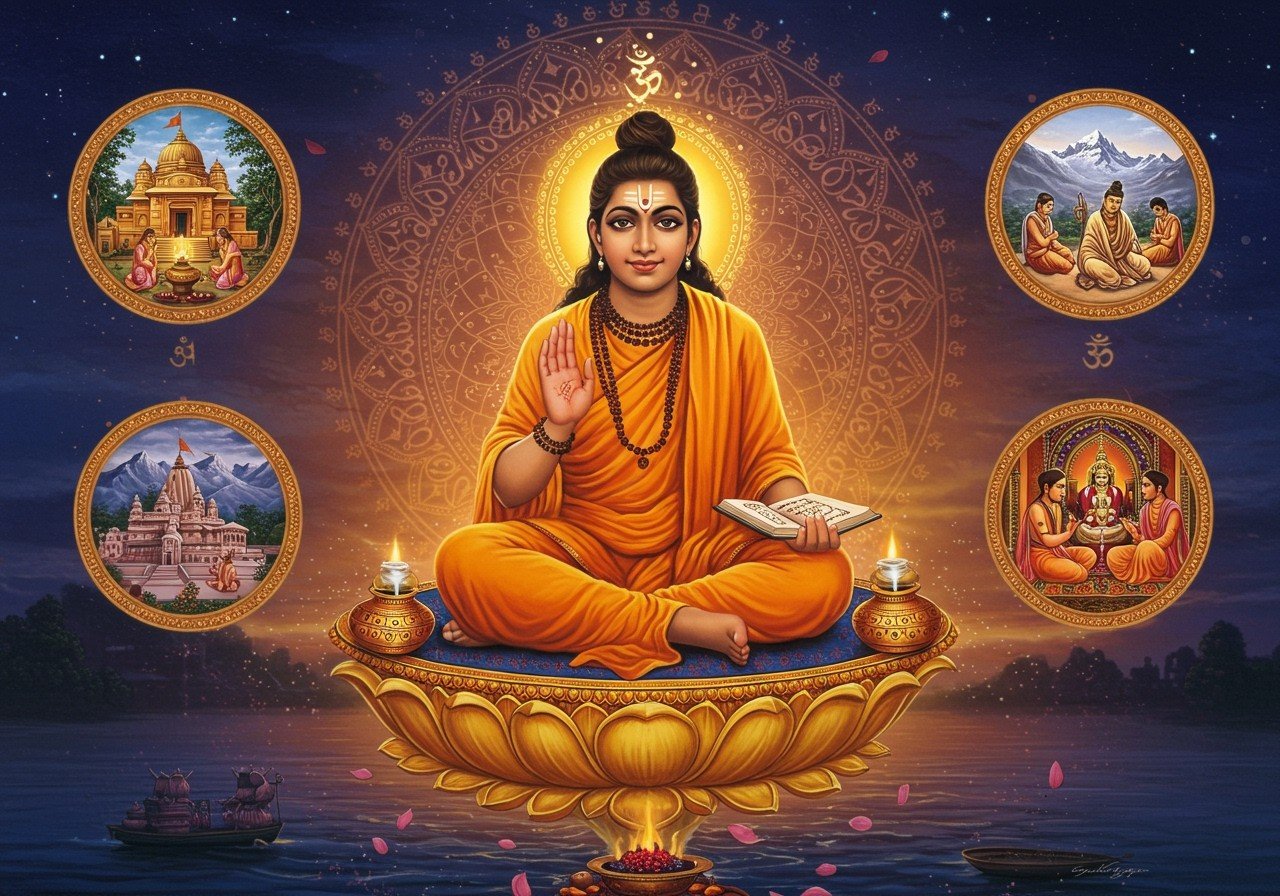
Adi Shankara, also known as Adi Shankaracharya, was a remarkable 8th-century Indian Vedic scholar and philosopher. His profound impact on Hinduism and Indian philosophy continues to resonate even today. This article delves into his life, teachings, and enduring legacy.
Who is Adi Shankara?
Adi Shankara is renowned for his significant contributions to Indian philosophy and spirituality. He revitalized Hinduism during a period of decline, unifying diverse philosophical schools into a cohesive framework. Shankara’s focus on Advaita, or non-dualism, teaches the oneness of the individual soul (Atman) and the ultimate reality (Brahman). His commentaries on Hindu scriptures, including the Upanishads, the Bhagavad Gita, and the Brahma Sutras, remain essential texts for students of Vedanta. His life and teachings continue to be a source of inspiration for spiritual seekers worldwide.
Explore more about connecting with your inner self through Hindu philosophy on poojn.in
Adi Shankara’s Birth and Early Life
Born in Kalady, Kerala, to devout Brahmin parents, Shankara’s birth is considered miraculous. Celebrated with festivals, especially in Kerala, his birthplace is a revered pilgrimage site. While the exact dates remain uncertain, he is believed to have lived between 788-820 CE. From a young age, Shankara displayed extraordinary intellectual and spiritual promise, mastering the Vedas by the age of eight. After his father’s death, Shankara’s desire for spiritual knowledge increased, leading him to choose a monastic path under his guru, Govinda Bhagavatpada. He then embarked on extensive travels across India, engaging in philosophical debates and disseminating his teachings. To ensure the continuation of his spiritual legacy, he established four mathas (monastic centers) in different regions.
The Philosophy of Adi Shankara: Advaita Vedanta
Shankara’s Advaita Vedanta posits that the ultimate reality is a single, indivisible consciousness—Brahman. This non-dualistic perspective challenges the perception of duality, suggesting that perceived differences are an illusion (Maya). Shankara sought to harmonize various Hindu texts and traditions, advocating Jnana Yoga, the path of knowledge, as the means to self-realization. His debates with other philosophical schools, including Buddhism, underscored the depth and rigor of his philosophical insights.
Dive deeper into Hindu Philosophy with our beginner’s guide at poojn.in
The Enduring Impact of Adi Shankara’s Philosophy
Adi Shankara’s contributions to Indian spirituality are immeasurable.
- Advaita Vedanta: He systematized Advaita Vedanta, emphasizing the non-dual nature of reality, where Brahman and Atman are one. This profound insight challenges our understanding of self and the world around us, encouraging self-inquiry as the path to liberation. His teachings encourage individuals to question their true identity, leading to the realization of “I am Brahman”.
- Unification of Hinduism: Shankara played a pivotal role in unifying various Hindu sects, including Vaishnavism, Shaivism, and Saktism. He introduced the Pañcāyatana form of worship, honoring five deities – Ganesha, Surya, Vishnu, Shiva, and Devi – as different manifestations of the one Brahman. This fostered harmony and understanding among diverse beliefs within Hinduism.
- Legacy of Teachings: Shankara’s emphasis on self-inquiry, detachment, and the realization of oneness continues to inspire spiritual seekers. His teachings offer profound insights into life’s purpose and the journey towards spiritual awakening. His message of non-duality and self-realization continues to inspire spiritual seekers, offering a profound understanding of life’s purpose.
- Establishment of Mathas: Shankara established four major Mathas across India – Sringeri, Dwarka, Puri, and Badrinath. These institutions served as centers of learning, spiritual practice, and the dissemination of Advaita Vedanta, ensuring the preservation and propagation of his teachings.
- Debates and Discourses: Shankara’s engagement in philosophical debates with scholars from diverse schools of thought, including Buddhism, Jainism, and dualistic Vedanta, demonstrated his intellectual prowess and solidified his reputation as a leading philosopher of his time. His logical reasoning and insights earned him recognition as a prominent scholar.
- Defense against Atheism: During a time of rising atheism due to excessive ritualism, Shankara championed Vedic faith, emphasizing that “Brahma, or God, is the ultimate truth, and the world is an illusion.” This defense of spiritual principles reinforced the importance of inner realization over mere external rituals.
Exploring Essential Puja Items for Worshipping Adi Shankara
Poojn.in offers a curated selection of authentic puja items to honor Adi Shankara:
- Clay Doat for Saraswati Puja: Perfect for honoring the goddess of knowledge and wisdom.
- Srimad Bhagavad Gita: Delve deeper into the philosophical teachings that influenced Adi Shankara.
- Pure Kalwa Raksha Sutra: A sacred thread symbolizing protection and blessings.
Visit www.poojn.in to explore our complete collection for all your puja needs.
Conclusion
Adi Shankara’s life and teachings continue to illuminate the path of spiritual understanding. His efforts to unify Hinduism and establish core philosophical principles have left an enduring mark on Indian spirituality. By emphasizing the non-dual nature of reality, he encourages us to explore the depths of self and the universe. His establishment of the Mathas ensures that his teachings remain accessible, fostering a community dedicated to learning and spiritual growth. Reflecting on his legacy inspires us to seek inner truth and harmony, carrying forward his vision of a unified spiritual world.


